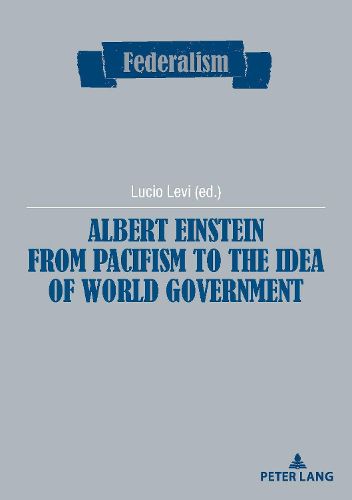Readings Newsletter
Become a Readings Member to make your shopping experience even easier.
Sign in or sign up for free!
You’re not far away from qualifying for FREE standard shipping within Australia
You’ve qualified for FREE standard shipping within Australia
The cart is loading…






This title is printed to order. This book may have been self-published. If so, we cannot guarantee the quality of the content. In the main most books will have gone through the editing process however some may not. We therefore suggest that you be aware of this before ordering this book. If in doubt check either the author or publisher’s details as we are unable to accept any returns unless they are faulty. Please contact us if you have any questions.
Albert Einstein was one of the initiators of the peace movement in Europe in the early twentieth century. He tirelessly denounced the imperfections of society due to the primitive institution of war and devoted his energies to outlawing war. After Hitler’s rise to power, he abandoned pacifism and instead embraced a federalist vision according to which the root cause of war lies in the division of the world into sovereign states and the vehicle of peace is world government.
This book explores Einstein’s outlook on war and peace and traces the evolution of his thinking on these topics. In particular, Einstein developed a dialogue on war and peace with physicists like Bohr, Planck and Szilard as well intellectuals like Dewey, Freud, Gandhi, Mann, Mumford, Rolland Russell, Schweitzer and Tagore. The key concepts that were the focus of these discussions were the cause of war (included the Einstein-Freud debate on psychological and political causes of war) and the means to prevent it; the distinction between antimilitarism, pacifism, internationalism and federalism; and the dividing line between intergovernmental and supranational organizations.
$9.00 standard shipping within Australia
FREE standard shipping within Australia for orders over $100.00
Express & International shipping calculated at checkout
This title is printed to order. This book may have been self-published. If so, we cannot guarantee the quality of the content. In the main most books will have gone through the editing process however some may not. We therefore suggest that you be aware of this before ordering this book. If in doubt check either the author or publisher’s details as we are unable to accept any returns unless they are faulty. Please contact us if you have any questions.
Albert Einstein was one of the initiators of the peace movement in Europe in the early twentieth century. He tirelessly denounced the imperfections of society due to the primitive institution of war and devoted his energies to outlawing war. After Hitler’s rise to power, he abandoned pacifism and instead embraced a federalist vision according to which the root cause of war lies in the division of the world into sovereign states and the vehicle of peace is world government.
This book explores Einstein’s outlook on war and peace and traces the evolution of his thinking on these topics. In particular, Einstein developed a dialogue on war and peace with physicists like Bohr, Planck and Szilard as well intellectuals like Dewey, Freud, Gandhi, Mann, Mumford, Rolland Russell, Schweitzer and Tagore. The key concepts that were the focus of these discussions were the cause of war (included the Einstein-Freud debate on psychological and political causes of war) and the means to prevent it; the distinction between antimilitarism, pacifism, internationalism and federalism; and the dividing line between intergovernmental and supranational organizations.